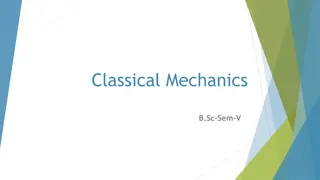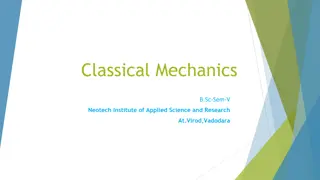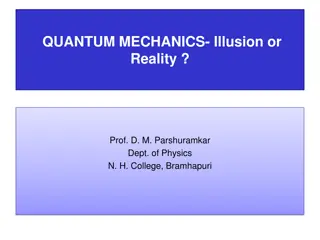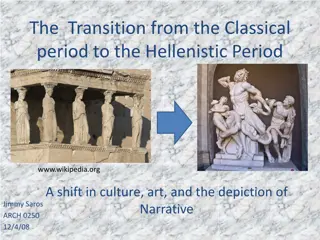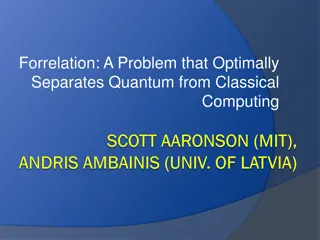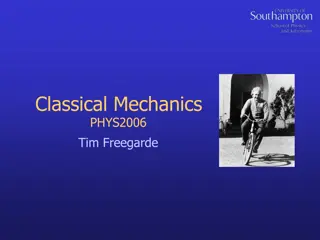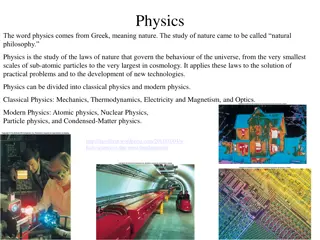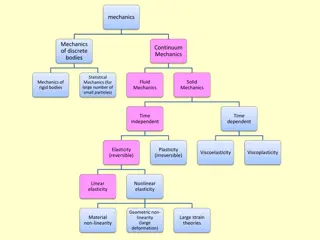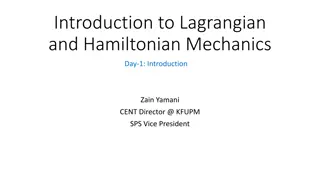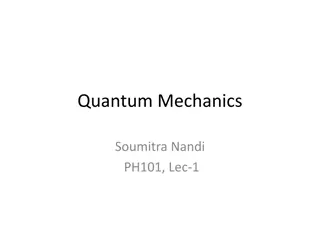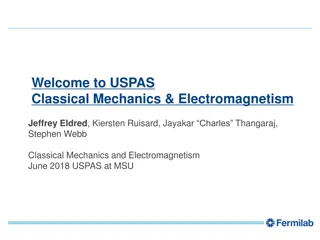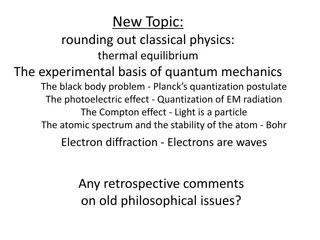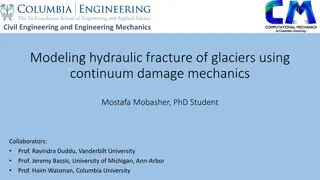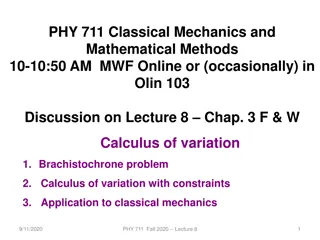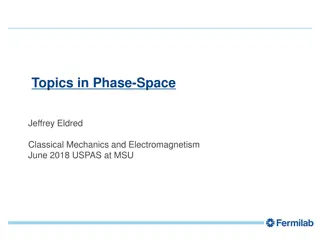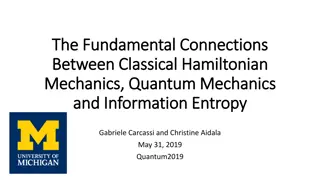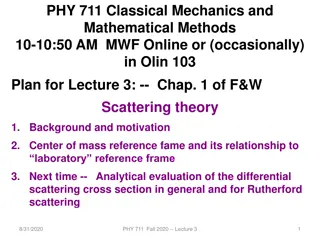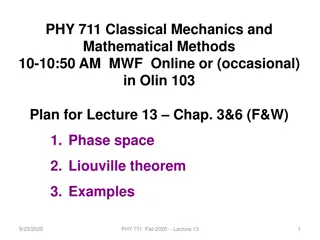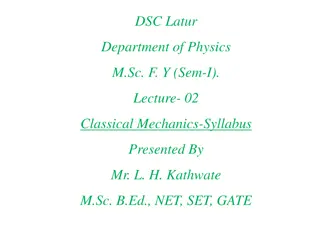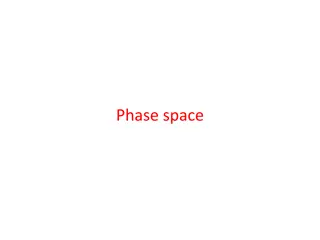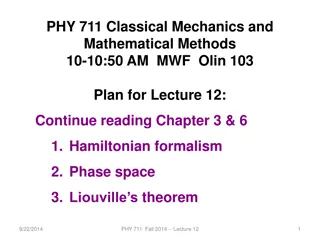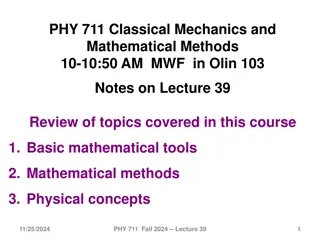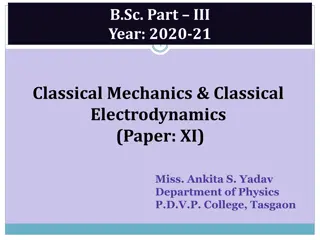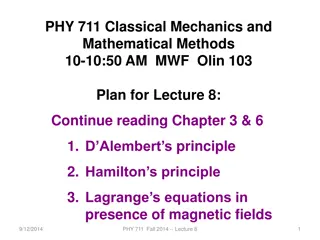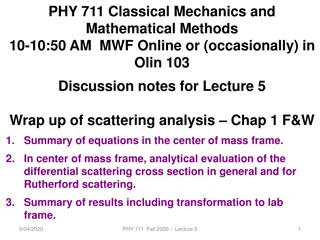Classical Mechanics: Variational Principle and Applications
Classical Mechanics explores the Variational Principle in the calculus of variations, offering a method to determine maximum values of quantities dependent on functions. This principle, rooted in the wave function, aids in finding parameter values such as expectation values independently of the coor
2 views • 16 slides
Classical Mechanics at Neotech Institute of Applied Science and Research, Virod
Delve into the world of Classical Mechanics in B.Sc Semester-V at Neotech Institute of Applied Science and Research, located in Virod, Vadodara. Explore topics such as motion of rigid bodies, angular momentum, Euler's theorem, inertia tensor, and Euler's equations of motion through a comprehensive s
0 views • 27 slides
Examples of Classical and Operant Conditioning
Robert receiving a ticket for driving under the influence illustrates operant conditioning with negative punishments, while Chris being afraid of dogs after being bitten showcases classical conditioning with stimulus generalization. Jacob's joy from smelling his date's cologne demonstrates classical
2 views • 9 slides
Quantum Mechanics: Illusion or Reality?
Delve into the fascinating realm of quantum mechanics with Prof. D. M. Parshuramkar as he discusses the contrast between classical and quantum mechanics. Discover how classical mechanics fails to predict the behavior of electrons in atoms and molecules, leading to the development of quantum mechanic
2 views • 70 slides
Classical Mechanics and Fields in Physics
Explore the concepts of radiation, matter, fields, Hamiltonian, and more in classical mechanics with a focus on velocity-dependent potentials and conservative systems. Dive into the detailed discussions on gauge theory, Coulomb gauge, magnetic fields, and Hamiltonian operators within the framework o
0 views • 28 slides
Transition from Classical to Hellenistic Period: Art and Narratives
The evolution from the Classical period to the Hellenistic period in Ancient Greece brought significant shifts in culture, art, and storytelling. Classical art focused on idealized human forms and naturalistic poses, while Hellenistic art embraced more dramatic expressions and emotions. The narrativ
1 views • 23 slides
Quantum vs. Classical Computing: Exploring Forrelation Problem
Delve into the world of quantum and classical computing with the Forrelation problem that optimally separates the two realms. From Fourier correlations to quantum algorithms and classical lower bounds, explore the intricacies of distinguishing between quantum and classical computation through variou
2 views • 29 slides
The Logical Structure of Classical and Quantum Mechanics
The paper explores the common logical structure shared between classical and quantum mechanics, emphasizing the non-distributive lattice embedded in a distributive one. It discusses how all physical theories must adhere to this structure, incorporating topology, Heyting algebra, Boolean algebra, and
3 views • 36 slides
Basics of Learning: Classical and Operant Conditioning Overview
Types of learning include classical conditioning, operant conditioning, and observational learning. Classical conditioning involves pairing a neutral stimulus with a meaningful one to elicit a response. Operant conditioning focuses on how consequences influence behavior. Terminology like UCS, UCR, N
1 views • 66 slides
Classical Mechanics in Physics
Delve into classical mechanics with topics ranging from helicopter dynamics and bicycle dynamics to inclined planes and the principles of Newton's laws of motion. Learn about the unique characteristics of instruments like the pianoforte and the foundational principles governing linear and angular mo
1 views • 14 slides
Physics: From Classical Mechanics to Relativistic Quantum Mechanics
Physics, derived from Greek meaning "nature," encompasses the study of the laws governing the universe at all scales. Classical physics delves into mechanics, thermodynamics, electricity, and optics, while modern physics covers atomic, nuclear, and particle physics. Relativistic Quantum Mechanics co
1 views • 14 slides
Conservation Principles in Fluid Dynamics and Classical Mechanics
Conservation principles play a significant role in fluid dynamics and classical mechanics. In fluid dynamics, conservation of mass, momentum, and energy are crucial for understanding fluid behavior. Classical mechanics, on the other hand, relies on Newton's laws to describe motion and energy conserv
1 views • 46 slides
Overview of Mechanics and Continuum Mechanics
Mechanics explores the motion of matter and forces influencing it, covering topics such as Elasticity, Plasticity, and Viscoelasticity. Continuum Mechanics delves into the mechanics of bodies, focusing on continuity, homogeneity, and isotropy. Understanding external forces, stresses, and elasticity
2 views • 28 slides
Classical Mechanics and Quantum Theory: A Comprehensive Overview
Explore the fundamental principles of classical mechanics and quantum theory through the insightful teachings of Dr. R. R. Mistry. From the mechanics of particles to the wave-particle duality, delve into topics such as conservation laws, Schrodinger's equation, and the origins of quantum theory. Gai
0 views • 22 slides
Introduction to Lagrangian and Hamiltonian Mechanics: A Comprehensive Overview
This course provides a detailed introduction to Lagrangian and Hamiltonian Mechanics, covering topics such as the nature of physics, differentiation, calculus of variation, coordinate systems, and getting ready for Lagrangian Mechanics. It explores the relationship between math and physics, utilizin
2 views • 15 slides
Quantum Mechanics: Unveiling the Mystery of the Subatomic World
Quantum mechanics, the fundamental theory of atomic phenomena, reveals a bizarre yet fascinating world where particles exhibit wave-particle duality and probabilities rule. This theory, beyond direct human perception, explains behaviors in various materials and technologies, paving the way for quant
0 views • 8 slides
USPAS Classical Mechanics & Electromagnetism Course Overview
This USPAS course covers Classical Mechanics and Electromagnetism with a focus on topics such as Hamiltonian mechanics, accelerator magnets, relativity, and more. Taught by a team of expert instructors, the course structure includes lectures, homework sessions, exams, and graded assignments. Resourc
1 views • 7 slides
The Interplay Between Classical Physics and Thermodynamics in Quantum Mechanics
Delve into the foundational principles of classical physics and thermodynamics that paved the way for the development of quantum mechanics. From the black body problem to the quantization postulate by Planck, discover how key phenomena like the photoelectric effect and Compton effect shaped the unde
0 views • 20 slides
Hindustani Classical Music: An Introduction to Ragas and Vocal Techniques
Indian Classical Music encompasses two main styles - Hindustani and Carnatic Classical. This article focuses on Hindustani Classical Music, exploring its rich history, prominent ragas, and vocal techniques. Learn about the elements of melody, rhythm, and harmony, as well as the significance of notes
0 views • 12 slides
Relativistic to Classical Mechanics Transition
The transition from relativistic to classical mechanics involves setting the speed of light equal to a specific value, affecting various formulas. Explore concepts such as signal velocity, inertial reference frames, event intervals, and causal relationships to understand the key principles in this t
0 views • 50 slides
Modeling Hydraulic Fracture of Glaciers Using Continuum Damage Mechanics
Civil Engineering and Engineering Mechanics study hydraulic fracture of glaciers with a focus on continuum damage mechanics. The project involves a viscoelastic ice model and explores the effects of surface and basal crevasses on glacier calving. The research incorporates empirical models, linear el
0 views • 14 slides
Classical Mechanics and Electromagnetism Overview
Delve into the intricacies of classical mechanics and electromagnetism through detailed discussions on topics such as plane waves, Lienard-Wiechert potentials, Maxwell's equations, Poynting vector, and retarded time. Explore the fundamental principles and concepts that govern the behavior of electro
0 views • 18 slides
Studies of Lithiumization and Boronization in NSTX-U
Calculating chemistry, retention of D, and chemical sputtering of B-C-O-D, Li-C-O-D, and B-Li-C-O-D surfaces using atomistic approaches. Exploring fundamental processes in time and space. Utilizing classical molecular dynamics and quantum-classical molecular dynamics for verification. Addressing cha
0 views • 10 slides
Classical Mechanics and Mathematical Methods: Lecture 8 - Calculus of Variation
This content provides information on Lecture 8 focusing on the calculus of variation, including topics like the Brachistochrone problem, calculus of variation with constraints, and its applications in classical mechanics. Questions from students are addressed regarding assignments, integral equation
0 views • 33 slides
Computational Chemistry Methods
The field of computational chemistry focuses on simulating chemical systems to provide detailed information at an atomic level. This involves two main methodological families: quantum chemical methods and molecular mechanics. Quantum chemistry methods explicitly consider electrons, while molecular m
0 views • 21 slides
Investigating Classical Limit of Quantum Ideal Gas
Exploring the classical limit of a quantum ideal gas where mean occupancy of one-particle states is much less than 1, allowing neglect of quantum effects except for indistinguishability. By analyzing the mean number of particles in the gas, integrating over energy states, and calculating the chemica
0 views • 14 slides
Understanding Linear and Nonlinear Oscillators in Classical Mechanics
Explore the concepts of linear and nonlinear oscillators, derivatives, differential equations, and harmonic oscillators in classical mechanics and electromagnetism. Learn about the linearization of differential equations, Taylor expansion of forces, and methods of solving harmonic oscillators. Dive
0 views • 12 slides
Understanding Stability of Fixed Points in Classical Mechanics and Electromagnetism
Explore the concept of fixed points in phase-space, their stability, and linearization for stability analysis in classical mechanics and electromagnetism. Learn how to identify stable and unstable fixed points using vector diagrams and eigenvalues. Gain insights into the motion near fixed points and
0 views • 14 slides
Understanding the Fundamental Connections between Classical Hamiltonian Mechanics, Quantum Mechanics, and Information Entropy
Explore the interplay between classical Hamiltonian mechanics, quantum mechanics, and information entropy through a discussion on the assumptions of physics and a general mathematical theory of experimental science. Discover how the concepts of experimental verifiability, irreducibility, and infinit
0 views • 15 slides
Scattering Theory in Classical Mechanics: Lecture 3 Highlights
Explore the fundamentals of scattering theory in classical mechanics, covering topics such as center of mass reference frame, analytical evaluation of differential scattering cross section, and experimental setups like those at CERN. Understand the significance of cross sections and their applicatio
0 views • 30 slides
Exploring Phase Space and Liouville Theorem in Classical Mechanics
Dive into the concepts of phase space and the Liouville theorem in classical mechanics. Understand the significance of density of particles, Poisson brackets, and Hamiltonian formalism in describing the behavior of systems. Discover the notions of momentum, coordinates, and degrees of freedom in pha
1 views • 40 slides
Understanding Classical Mechanics and Electromagnetism at USPAS, June 2018
Dive into a comprehensive review of classical mechanics and electromagnetism from the June 2018 USPAS program at MSU with topics covering oscillators, perturbation, special relativity, Lagrangians, Hamiltonians, phase-space, stability, canonical transformations, and accelerator Hamiltonians.
0 views • 13 slides
Exploring Classical Mechanics: Principles and Formulations
Delve into the world of classical mechanics covering elementary principles, Lagrangian and Hamiltonian formulations, and more. Understand the core differences between classical and quantum mechanics while studying the motion of physical objects under various interactions.
0 views • 15 slides
Understanding Phase Space in Classical and Quantum Mechanics
Explore the concept of phase space, where a hypothetical space molecule is visualized as a point in a six-dimensional space with translational motion. Uncertainty principle dictates the minimum volume of a cell in phase space, impacting the localization of particles. Classical mechanics and quantum
0 views • 25 slides
Hamiltonian Formalism in Classical Mechanics Lectures Summary
Explore the Hamiltonian formalism in classical mechanics through lectures covering topics such as phase space, Liouville's theorem, time evolution, Poisson brackets, and phase space diagrams for one-dimensional motion under different forces. Dive into the mathematical methods behind Hamiltonian mech
0 views • 20 slides
Mathematical Methods and Classical Mechanics Review
Explore the concepts of mathematical methods and classical mechanics through a comprehensive review, including discussions on presentation and exams, computational projects, and upcoming assessments like the take-home final. Dive into topics like special functions, complex numbers, and derivatives w
0 views • 30 slides
Classical Mechanics and Mathematical Methods Review
Explore a review of basic mathematical tools, mathematical methods, physical concepts, and functional dependencies covered in a Classical Mechanics and Mathematical Methods course lecture.
0 views • 46 slides
Classical Mechanics & Classical Electrodynamics in B.Sc Part III Year Syllabus
Explore the detailed syllabus of B.Sc Part III Year 2020-21 at P.D.V.P College, focusing on Classical Mechanics, Classical Electrodynamics, Mathematical Physics, Quantum Mechanics, and more. Dive into topics like Lagrangian Formulation, Techniques of Calculus of Variation, Special Theory of Relativi
0 views • 17 slides
Understanding Classical Mechanics Principles: D'Alembert, Hamilton, Lagrange Equations
Explore the fundamental principles of classical mechanics in Lecture 8, covering D'Alembert's principle, Hamilton's principle, and Lagrange equations in the presence of magnetic fields. Dive into the concepts of virtual work, generalized coordinates, and physical trajectories of generalized coordina
0 views • 18 slides
Scattering Analysis in Classical Mechanics: Lecture 5 Wrap-Up and Summary
Dive into the conclusive breakdown of scattering analysis, focusing on the evaluation of differential scattering cross-sections in the center of mass frame, with a special emphasis on Rutherford scattering. Explore transformations to the lab frame and key equations for a comprehensive understanding.
0 views • 38 slides
